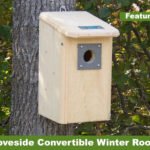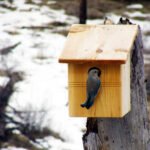It’s that time of year when we take a moment to admire the great turkey. Even though our relationship with these interesting birds tends to be of the vulturine variety, many people enjoy having them visit their yards.
Before we relay some tips for attracting wild turkeys to your property, it’s important to note that turkeys aren’t always the easiest guests. Wild turkeys can be loud, messy, gluttonous, territorial, and even dangerous. If you haven’t heard that great This American Life story about a turkey wreaking havoc on Martha’s Vineyard by literally attacking people, you should take a listen.
Live in a wooded area where turkeys frequent and still interested in getting these rambunctious birds into your yard? Read on.

Offer seeds, cracked corn, nuts, and berries
Turkeys eat a wide variety of foods, including everything from insects to crabapples. One way to attract wild turkeys is to set up a ground feeding station or use a platform feeder with cracked corn, nuts, and mixed birdseed. You may not want to encourage turkeys to go to the feeding stations you use for other species because turkeys can be territorial and drive away songbirds.
Plant native oaks and nut/berry producing plants
Even better than offering food to turkeys is to provide them with natural food sources. Not only will this make it easier on you and your wallet (feeding turkeys can be expensive) but it’s also great for the general ecosystem.
Native oaks produce acorns for turkeys to eat. Pecans, crabapples, hackberries, and hickory nuts are also staples of turkey diets so opt for plants that produce these types of food and are native to your area.

Leave plant matter on the ground
When the leaves fall from trees, don’t rush to pick them up. Leaving the leaves will help foster the types of ecosystem and critters that turkeys love. Insects will thrive in the cover and turkeys (and other birds) will have a field day.
Along the same lines, leaving piles of brush will create a mini-ecosystem where turkeys thrive. A brush pile also provides a place for turkeys to nest.
Provide water
Water is another way to get birds to come to your yard. Ground bird baths that mimic puddles or small streams, like the Winged Aquatics Bird Pond, will give the turkeys a place to drink. If you find larger flocks coming around, you may need something a bit bigger.
Don’t use pesticides
Pesticides and herbicides can cause harm to animals that frequent the area you spray. However, pesticides will also kill the types of insects turkeys love eating. Like everything else on this list, what’s good for turkeys is usually good for many other types of bird species.




2 Comments
feeders attract black bears not good
We have many wild turkeys visiting our yard sometimes more than once a day. We were simply providing bird feeders which resulted in some seed spilling on the ground. This brought groups of six or seven turkeys and groups of three or five deer to clean up what ever was left. The deer were mostly does and fawns. This winter was one of the worst and we began to put out food deliberately for the deer and the turkeys. But only the deer visited regularly all winter long. We have witnessed a deer chasing a cat out of our yard with snorting and stomping feet and a turkey attacking our car because he saw his reflection. But lately we have more squirrels and bluejays then anything and they are driving the nice birds out. I have just looked up info on how to control or deter them and will get to work fixing the problem. I don’t wish to harm or starve any animal. I just want them to share. We have also inadvertently fed skunks, porcupine, groundhogs, opossums, and raccoons.